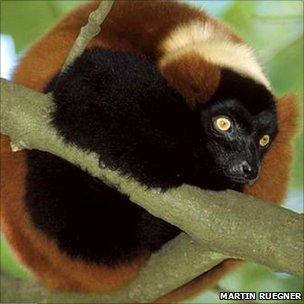Branson lemur plans bear fruit
- Published
- comments

The red ruffed lemur is one of the more threatened species on Madagascar
A few weeks ago, the BBC broke news of the consternation aroused by Sir Richard Branson, external's plans to bring lemurs to his Caribbean islands.
The boss of the Virgin business empire owns two of the smaller British Virgin Islands (BVI), external, and planned to have lemurs living in the forest on one of them, Moskito (also Mosquito) Island.
With the animals coming from zoos - some, reportedly, kept in poor conditions - the immediate outlook for the lemurs themselves was clearly positive, as they'd have forest to roam through rather than a cage to stare through.
But local conservation experts raised concerns over the impact on native species, notably the dwarf gecko - and those concerns were echoed by world authorities on lemurs.
The question was also raised of whether different lemur species adapted to a variety of habitats across Madagascar could all find joy in a relatively small piece of Caribbean dry forest.
Introducing species from one region of the world into another region has more often ended in tears of sorrow than joy, which is why it is discouraged in guidelines, external issued by the International Union for the Conservation of Nature (IUCN), external.
I think it's fair to say that Sir Richard was not particularly happy when those criticisms emerged; from his perspective, he was aiming to give the animals a better home than the ones they were leaving, so what was there to beef about?
"The debate about the plight of the lemurs and what should be done about them, and whether or not my idea was a good idea or bad idea was certainly an eye-opener to me and I suspect to all of us," he said in a recent e-mail.
Subsequently, he's been in contact with some of those experts who raised issues with his original scheme; and with the advice they've given, his plans for Moskito Island have been modified.
Some lemurs have already arrived; and most importantly, they're to be kept in enclosures rather than wandering the forest.
There's also now a lucid conservation objective:
"Using the advice of the world's leading experts on lemurs, I would like to select a handful of endangered and critically endangered species for ex-situ (captive) breeding - to provide assurance colonies should they disappear or become severely depleted in the wild.

Sir Richard Branson: "eyes opened" by criticisms of his original scheme
"Possible candidate species include the (red) ruffed lemurs, black and white ruffed lemurs and the blue-eye black lemur.
"These particular species have not bred well in most zoos because they are apt to become slightly obese from lack of exercise."
The possibility that some of these species will become extinct in Madagascar, their only natural home, are high.
Twenty years ago, the entire population of black and white ruffed lemurs , external was estimated at 1,000-10,000, external, and it has certainly fallen since then.
The species' range has also become more fragmented, as tracts of forest have disappeared.
The red ruffed lemur, external is in somewhat ruddier health; but these things are relative only, and it is still classified as "endangered" on the internationally-recognised Red List of Threatened Species.
The priority for anyone looking at this picture is of course to protect those bits of forest that remain, and block further threats to the lemurs within those fragments, including illegal logging and capture for the pet trade.
And this is perhaps a more interesting consequence of Sir Richard's foray into the lemur world.
Combine the financial muscle that he commands - $4.2bn (£2.6bn) and rising, according to the Forbes "rich list", external - with the expertise of top conservationists, and potentially you have a team capable of making change where little else has worked.
Sir Richard says he is committed to investing more in conservation inside Madagascar, especially to safeguard habitat roamed by seriously at-risk species; and these plans should emerge during the year.
There's been another consequence, however - one that perhaps Sir Richard didn't originally envisage, but which might in the end turn out to be more important: publicity.
The Moskito episode may have generated a bit of adverse comment for the Virgin boss, but it's surely led to the plight of these creatures and their forest being raised in unfamiliar circles.
And if there's one thing lemurs need above all, it's to be noticed; not just for their huge beauty and charm, but for the fact that they're disappearing, and that stopping it is, in principle, feasible.